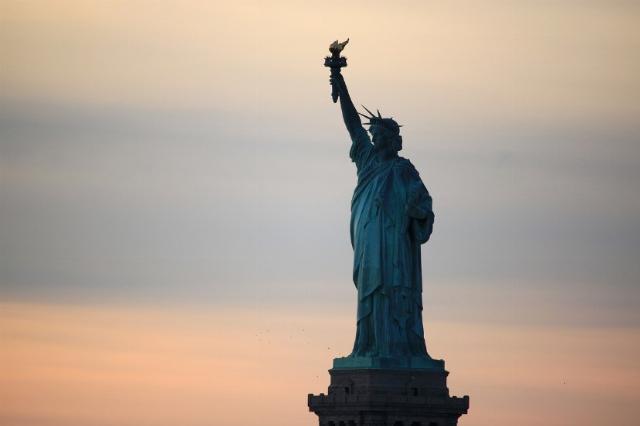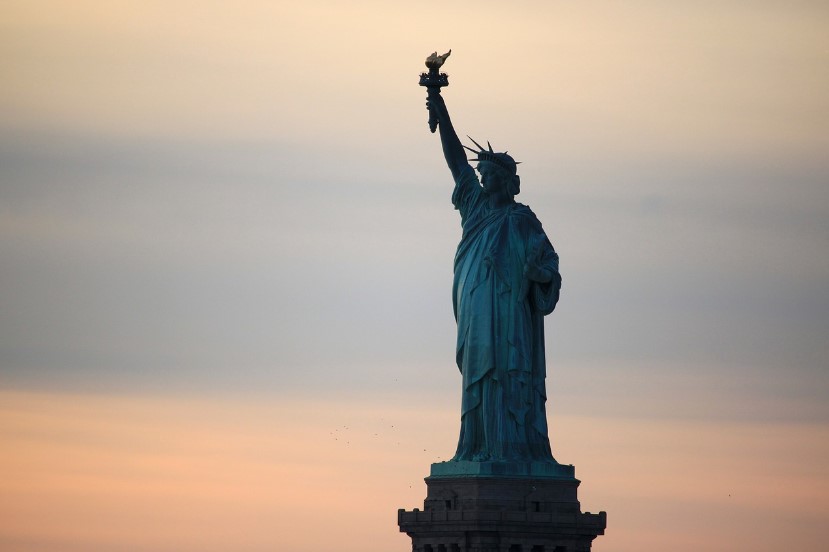

Photo Credit: Image: JSMed via Pixabay, Pixabay License.
JSMed
Government is the destroyer of liberty.Ah, 1776 — a time when the ruling aristocracy taxed Americans without their say, destroyed printing presses of those publishers demanding liberty, and jailed outspoken critics for treason. How things have changed — not! If there were one indispensable truth to be learned from America’s glorious Independence, it is this: governments do not give freedom; they take freedom away.
Any smooth-talking politician who pretends that government should be praised for the “gifts” it bestows upon the people is a smiling agent of the Crown fashioning new chains for citizens to wear. Laws, taxes, and regulations do not liberate human beings; they are the bricks and mortar trapping us inside ever-smaller cells.
Government is the destroyer of liberty. Bureaucracies do not light the flame of freedom; they snuff freedom’s light out. People alone (separate from the organizing strictures of the State) secure their liberty by pushing back against and restraining the otherwise ever-growing oppression of power-hungry governments. Citizens hold the keys to their own prison cells. They must only find the courage to open up their doors and walk outside. This was true in 1776; it is no less true today.
What is remarkable about the period leading up to the American Revolution is how quickly public sentiment shifted. By and large, colonists saw themselves as loyal servants of the English Crown until, suddenly, they were not. They celebrated King George III’s birthday each year. They formed militias to aid their king in wars against his European foes. As late as 1775, few Americans desired anything so radical as political Independence. The idea seemed far-fetched.
A year after the Battles of Lexington and Concord, half a year after the publication of Thomas Paine’s Common Sense, and a month after Richard Henry Lee of Virginia urged the Second Continental Congress to declare the United Colonies, “free and independent States,” Americans were well on their way to separating from the British Empire for good. Colonial delegates agreed to a Resolution for Independence on July 2, approved Thomas Jefferson’s Declaration of Independence on July 4, began publishing the Declaration on July 6, and publicly read the Declaration in Philadelphia’s Independence Square on July 8. A year later, Philadelphia celebrated July 4 as an official Independence Day holiday with music, bonfires, parades, military processions, speeches, and fireworks. From loyal servants of the Crown to rebellious rabble-rousers who staged mock funerals for King George in the space of two years. Sometimes History comes at you fast.
Fifteen years earlier, American colonists had been fighting alongside British redcoats in the French and Indian War. Now they were conducting guerrilla warfare campaigns against English garrisons and seizing English vessels. America had no navy; young fishermen and sea merchants created one. America lacked well-trained, professional soldiers. Sharpshooting hunters with accurate long rifles had to suffice. America didn’t have enough young men to bear alone the burden of fighting. Old veterans, patriotic young women, and dedicated wives became instrumental to the Revolution’s success.
Samuel Whittemore, around eighty years old when the British marched on Lexington, is often credited as the oldest colonial combatant. His obituary recounts the remarkable man’s heroics on April 19, 1775. “If I can only be the instrument of killing one of my country’s foes I shall die in peace,” he reportedly declared. Killing a redcoat with his rifle, taking out two more with his horse pistols, and drawing a sword to defend himself from advancing soldiers, Whittemore was shot in the face and bayonetted several times. “We have killed the old rebel,” the British allegedly exclaimed. “About four hours after,” his obituary records, Whittemore “was found in a mangled situation…but providentialy none” of the blades had “penetrated so far as to destroy him; his hat and cloaths [sic] were shot through in many places, yet he survived to see the complete overthrow of his enemies, and his country enjoy all the blessings of peace and independence.” Now that’s an obituary! Amazingly, Captain Whittemore lived another eighteen years after being left for dead.
I like to think that men such as Samuel Whittemore scared the bejesus out of the British Regulars. The Crown’s professional soldiers marched in formation and followed rules of gentlemanly conduct, and out of nowhere, some eighty-year-old madman was jumping out from behind a wall and firing on them without warning. “You’re not playing by the rules,” I bet they cried. “What rules?” Whittemore probably replied.
His story reminds me of that of Daniel Morgan, who formed a company of Virginia riflemen and marched six hundred miles to Boston in under three weeks in the summer of ‘75. During the French and Indian War, Morgan had been lashed five hundred times (yet miraculously survived) for punching an English officer in the face. He never forgot the lesson. In Massachusetts, he ordered his legendary snipers to take out British officers who believed they were well out of range. The British army was outraged. Morgan didn’t care.
In his memoir, Private Yankee Doodle, Joseph Plumb Martin described the heroics of Mary Ludwig Hays at the Battle of Monmouth. When her husband went down in the fighting, Hays began loading cannon in his place. Martin described the scene: “A cannon shot from the enemy passed directly between her legs without doing any other damage than carrying away all the lower part of her petticoat. Looking at it with apparent unconcern, she observed that it was lucky it did not pass a little higher, for in that case it might have carried away something else.” Pennsylvania later rewarded her with a veteran’s pension.
Another woman, Deborah Sampson, disguised herself as a man and enlisted in the Continental Army as Robert Shurtleff. As part of a light infantry unit, she was involved in many skirmishes and got shot twice — and even removed one of the musket balls herself to avoid discovery. She was later honorably discharged, married a farmer, and received a military pension from the state of Massachusetts. Incredibly, Congress later granted her a federal military pension after the intervention of a rather famous friend — Paul Revere.
Never underestimate ordinary people determined to advance a cause. In the eighteenth century, the British redcoats were the preeminent fighting force in the world and represented the most powerful empire on the planet. Still, they could not best colonial irregulars who were willing to risk all for victory. Guns and bombs win battles. Hearts and minds win wars.
I look back at the feats of Deborah Sampson, Mary Hays, Daniel Morgan, and Samuel Whittemore and see a common attribute: they were men and women worth listening to. In my mind, there is no higher honor. We should all strive to conduct our lives in such a way that others might stop and listen to what we have to say. Those worth listening to tend to be people of principle, courage, conviction, and honor. During the American Revolution, our country was blessed with an extraordinary share of exceptional people.
Do not doubt that America is still blessed with an outsized share of heroes. I’ve met many. I’ve seen amazing people make tremendous sacrifices. I know many of you are heroes because I’ve had the chance to read your comments and reflect upon your words. If we were ever facing hardship as our ancestors did nearly two hundred and fifty years ago, I would want you all in a foxhole with me.
This patriotic time of year always reminds me of someone who is gone but never forgotten — Lloyd Marcus III, who passed away nearly four years ago. A tireless defender of America who loved his country dearly, the “Unhyphenated American” was unquestionably a man worth listening to. In spirit, he will always be in our foxhole, too.
Happy Independence Day!
<img alt="
Image: JSMed via Pixabay, Pixabay License.
” captext=”JSMed” src=”https://conservativenewsbriefing.com/wp-content/uploads/2024/07/the-spirit-of-1776.jpg”>
Image: JSMed via Pixabay, Pixabay License.





